Unitronics US5-B5-B1 Built-In UniStream Programmable Logic Controller
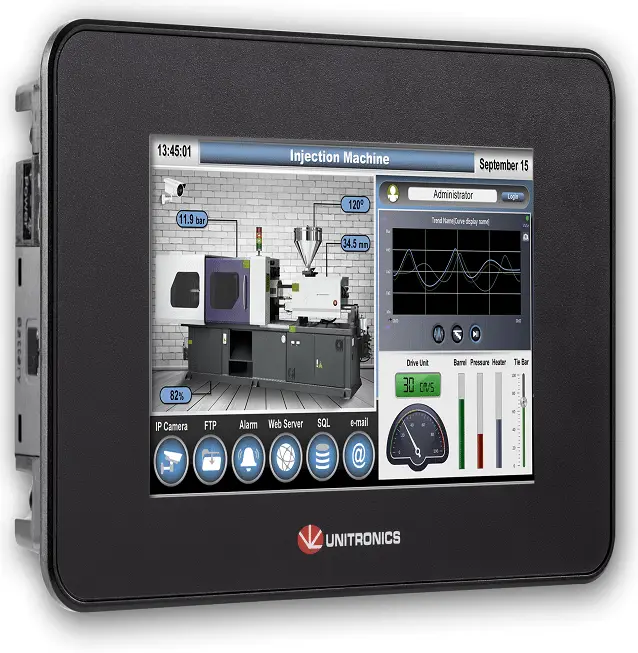
This guide provides basic installation and technical specifications for the UniStream® models listed above.
General Features
- Unitronics’ UniStream® Built-in series are PLC+HMI All-in-One programmable controllers that comprise a built-in CPU, an HMI panel, and built-in I/Os.
- The series is available in two versions: UniStream Built-in and UniStream Built-in Pro.
Note that a model number that includes:
- B5/C5 refers to UniStream Built-in
- B10/C10 refers to UniStream Built-in Pro. These models offer additional features, detailed below.
| General Features | |||
| HMI | § Resistive Color Touch-screens
§ Rich graphic library for HMI design |
||
| Power Features | § Built-in Trends and Gauges, auto-tuned PID, data tables, data sampling, and Recipes
§ UniApps™: Access & edit data, monitor, troubleshoot & debug and more – via HMI or remotely via VNC § Security: Multi-level password protection § Alarms: Built-in system, ANSI/ISA standards |
||
| I/O Options | § Built-in I/O configuration, varies according to model
§ Local I/O via UAG-CX series I/O expansion adapters and standard UniStream Uni-I/O™ modules § Remote I/O using UniStream Remote I/O or via EX-RC1 § US15 only – Integrate I/O into your system by using UAG-BACK-IOADP, snap onto the panel for an all- in-one configuration |
||
| COM
Options |
§ Built-in ports: 1 Ethernet, 1 USB host, 1 Mini-B USB device port (USB-C in US15)
§ Serial and CANbus ports may be added via UAC-CX modules |
||
| COM
Protocols |
§ Fieldbus: CANopen, CAN Layer2, MODBUS, EtherCAT (US15 models only), EtherNetIP and more. Implement any serial RS232/485, TCP/IP, or CANbus third-party protocols via Message Composer
§ Advanced: SNMP Agent/Trap, e-mail, SMS, modems, GPRS/GSM, VNC Client, FTP Server/Client, MQTT, REST API, Telegram, etc. |
||
| Programming Software | All-in-One software for hardware configuration, communications, and HMI /PLC applications, available as a free download from Unitronics. | ||
| Comparison table | Feature | B5/C5 | B10/C10 (Pro) |
| System Memory | 3GB | 6GB | |
| Audio Jack | No | Yes | |
| Video/RSTP Support | No | Yes | |
| Web Server | No | Yes | |
| SQL Client | No | Yes | |
Before You Begin
Before installing the device, the user must:
Read and understand this document.
- Verify the Kit contents.
- Alert Symbols and General Restrictions
When any of the following symbols appear, read the associated information carefully.
| Symbol | Meaning | Description |
| Danger | The identified danger causes physical and property damage. | |
| Warning | The identified danger could cause physical and property damage. | |
| Caution | Caution | Use caution. |
- All examples and diagrams are provided to assist with understanding and do not guarantee operation. Unitronics accepts no responsibility for the actual use of this product based on these examples.
- Please dispose of this product according to local and national standards and regulations.
- This product should be installed only by qualified personnel.
- If the equipment is used in a manner not specified by the manufacturer, the protection provided by the equipment may be impaired.
- Failure to comply with appropriate safety guidelines can cause severe injury or property damage.
- Do not attempt to use this device with parameters that exceed permissible levels.
- Do not connect/disconnect the device when power is on.
Environmental Considerations
- Ventilation: 10mm space is required between the device top/bottom edges and the enclosure’s walls
- Do not install in areas with excessive or conductive dust, corrosive or flammable gas, moisture or rain, excessive heat, frequent impact shocks or excessive vibration, in accordance with the standards and limitations given in the product’s technical specification sheet.
- Do not submerge the unit in water or allow water to leak onto it.
- Do not allow debris to fall inside the unit during installation.
- Install the unit as far as possible from high-voltage cables and power equipment.
UL Compliance
- The following section is relevant to Unitronics’ products that are listed with the UL.
- The following models are UL listed for Hazardous Locations: US5-B5-B1, US5-B10-B1, US7-B5-B1 and US7-B10-B1
The following models are UL listed for Ordinary Location:
- USL followed by -, followed by 050 or 070 or 101, followed by B05
- US followed by 5 or 7 or 10, followed by -, followed by B5 or B10 or C5 or C10, followed by -, followed by B1 or TR22 or T24 or RA28 or TA30 or R38 or T42
Models from series US5, US7 and US10 that include “T10” or “T5” in the model name are suitable for mounting on the flat surface of Type 4X enclosure. For examples: US7-T10-B1, US7-T5-R38, US5-T10-RA22 and US5-T5-T42.
UL Ordinary Location
In order to meet the UL ordinary location standard, panel-mount this device on the flat surface of Type 1 or 4X enclosures
UL Ratings, Programmable Controllers for Use in Hazardous Locations, Class I, Division 2, Groups A, B, C and D
These Release Notes relate to all Unitronics products that bear the UL symbols used to mark products that have been approved for use in hazardous locations, Class I, Division 2, Groups A, B, C and D.
Caution: This equipment is suitable for use in Class I, Division 2, Groups A, B, C and D, or Non-hazardous locations only.
- Input and output wiring must be in accordance with Class I, Division 2 wiring methods and in accordance with the authority having jurisdiction.
- WARNING—Explosion Hazard—substitution of components may impair suitability for Class I, Division 2.
- WARNING – EXPLOSION HAZARD – Do not connect or disconnect equipment unless power has been switched off or the area is known to be non-hazardous.
- WARNING – Exposure to some chemicals may degrade the sealing properties of material used in Relays.
- This equipment must be installed using wiring methods as required for Class I, Division 2 as per the NEC and/or CEC.
Panel-Mounting
For programmable controllers that can be mounted also on panel, in order to meet the UL Haz Loc standard, panel-mount this device on the flat surface of Type 1 or Type 4X enclosures.
Communication and Removable Memory Storage
When products comprise either USB communication port, SD card slot, or both, neither the SD card slot nor the USB port are intended to be permanently connected, while the USB port is intended for programming only.
Removing / Replacing the battery
When a product has been installed with a battery, do not remove or replace the battery unless the power has been switched off, or the area is known to be non-hazardous. Please note that it is recommended to back up all data retained in RAM, in order to avoid losing data when changing the battery while the power is switched off. Date and time information will also need to be reset after the procedure.
Kit Contents
- 1 PLC+HMI controller
- 4,8,10 mounting brackets (US5/US7, US10, US15)
- 1 panel mounting seal
- 2 panel supports (US7/US10/US15 only)
- 1 power terminal block
- 2 I/O terminal blocks (provided only with models comprising built-in I/Os)
- 1 Battery
Product Diagram

Front and Rear View
| 1 | Screen Protection | A plastic sheet attached to the screen for protection. Remove it during installation of the HMI Panel. |
| 2 | Battery Cover | The battery is supplied with the unit but must be installed by the user. |
| 3 | Power Supply Input | Connection point for the controller power source.
Connect the Terminal Block supplied with the kit to the end of the power cable. |
| 4 | MicroSD Slot | Supports standard microSD cards. |
| 5 | USB Host Port | Provides the interface for external USB devices. |
| 6 | Ethernet Port | Supports high-speed Ethernet communications. |
| 7 | USB Device | Use for application download and direct PC-UniStream communication. |
| 8 | I/O Expansion Jack | Connection point for an I/O Expansion Port.
Ports are supplied as part of I/O Expansion Model Kits. Kits are available by separate order. Note that UniStream® Built-in is compatible only with adapters from the series UAG-CX. |
| 9 | Audio Jack | Pro models only. This 3.5mm Audio Jack enables you to connect external audio equipment. |
| 10 | Built-in I/O | Model-dependent. Present in models with built-in I/O configurations. |
| 11 | Uni-COM™ CX Module Jack | Connection point for up to 3 stack-COM modules. These are available by separate order. |
| 12 | UAG-BACK-IOADP
Adapter Jack |
Connection point to UAG-BACK-IO-ADP Jack. Adapter is available by separate order. |
Installation Space Considerations
Allocate space for:
- the controller
- any modules that will be installed
- access to ports, jacks, and the microSD card slot
For exact dimensions, please refer to the Mechanical Dimensions shown below.
Mechanical Dimensions


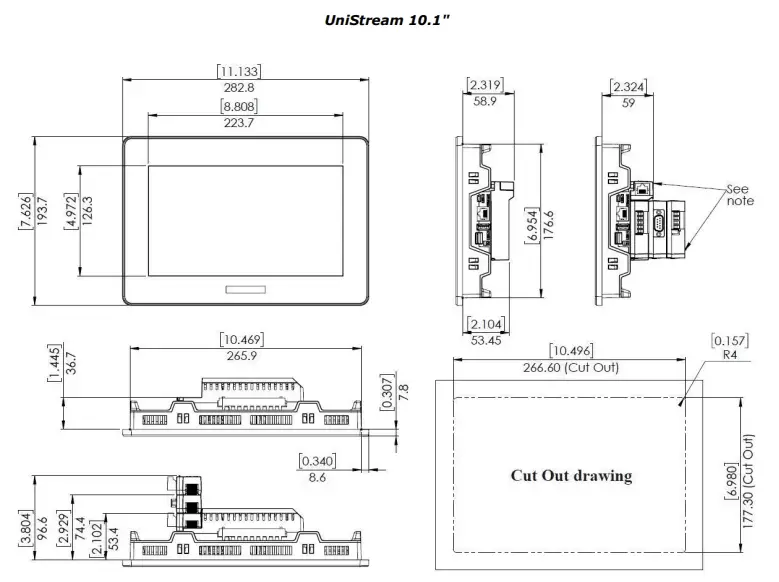
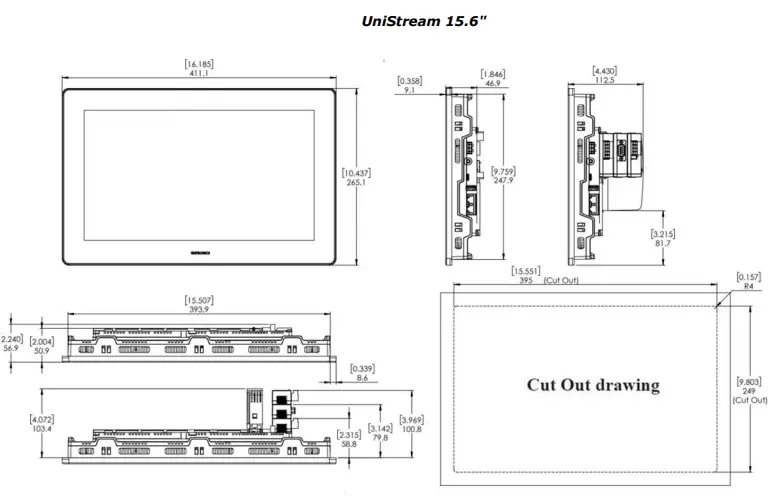
NOTE
Allow space for modules to be snapped onto the back of the controller, if required by your application. Modules are available by separate order.
Panel Mounting
NOTE
- Mounting panel thickness must be less or equal to 5mm (0.2”).
- Ensure that the space considerations are met.
- Prepare a panel cut-out according to the dimensions as shown in the previous section.
- Slide the controller into the cut-out, ensuring that the Panel Mounting Seal is in place as shown below.
- Push the mounting brackets into their slots on the sides of the panel as shown below.
- Tighten the bracket screws against the panel. Hold the brackets securely against the unit while tightening the screws. The torque required is 0.6 N·m (5 in-lb).
When properly mounted, the panel is squarely situated in the panel cut-out as shown below.
Caution: Do not apply torque exceeding 0.6 N·m (5 in-lb) of torque to tighten the bracket screws. Using excessive force to tighten the screw can damage this product.
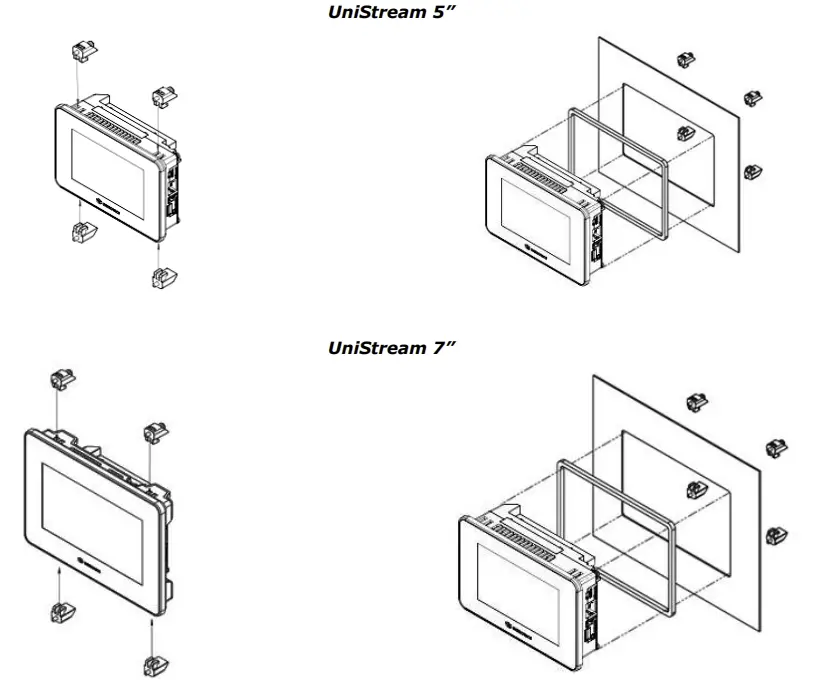
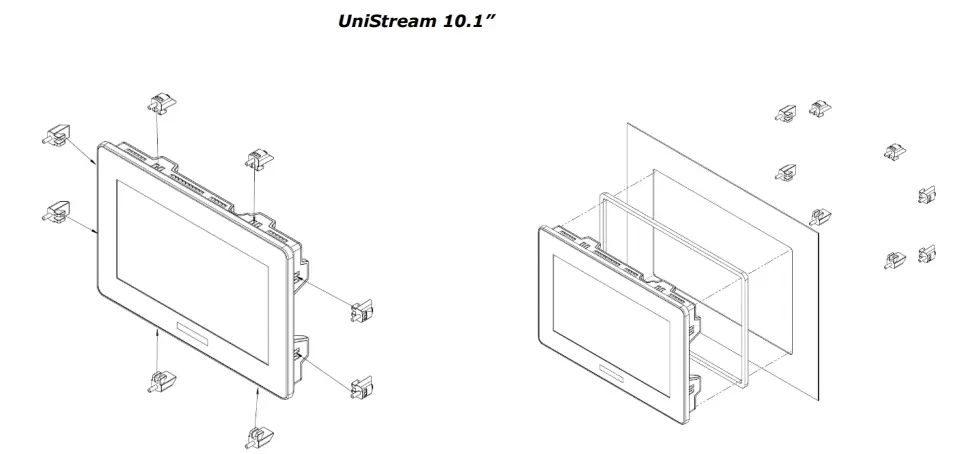
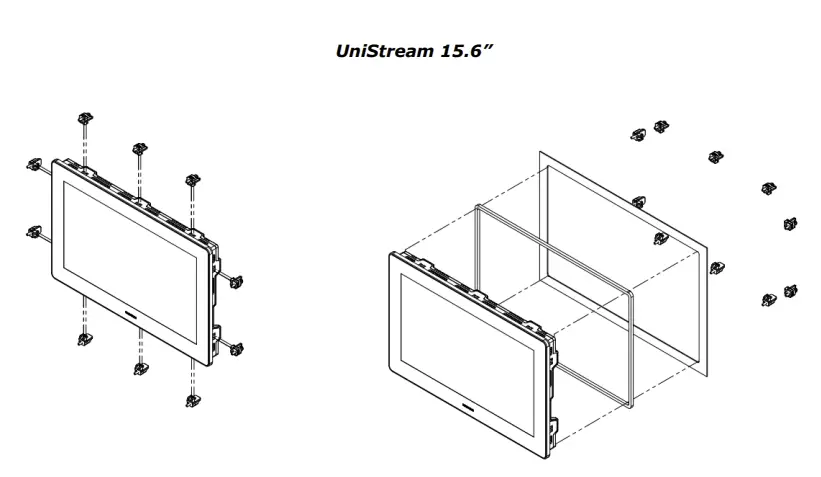
Battery: Back-up, First Use, Installation, and Replacement
Back-up
In order to preserve back-up values for RTC and system data in the event of power off, the battery must be connected.
First Use
- The battery is protected by a removable cover on the side of the controller.
- The battery comes pre-installed inside the unit with a plastic tab preventing contact. This tab must be removed by the user before use.
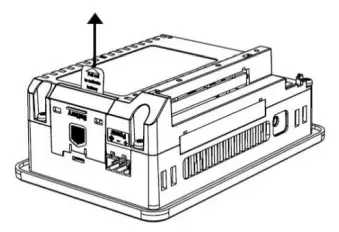
Battery Installation and Replacement
Use proper precautions to prevent Electro-Static Discharge (ESD) while servicing the battery.
Caution
- To preserve back-up values for RTC and system data during battery replacement, the controller must be powered.
- Note that disconnecting the battery halts the preservation of back-up values and causes them to be deleted.
- Remove the battery cover from the controller as shown in the accompanying figure:
- Press the tab on the module to disengage it.
- Slide it up to remove it.
- If you are replacing the battery, remove the battery from its slot on the side of the controller.
- Insert the battery, ensuring that the polarity is aligned with the polarity marking as shown in the accompanying figure.
- Replace the battery cover.
- Dispose of the used battery according to local and national standards and regulations.
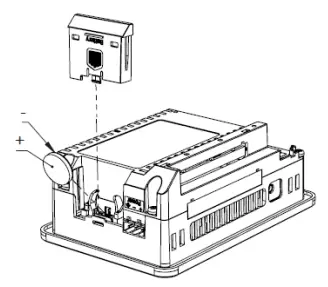
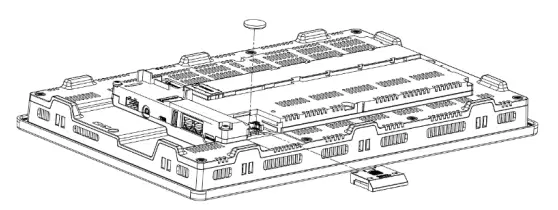
Wiring
- This equipment is designed to operate only at SELV/PELV/Class 2/Limited Power environments.
- All power supplies in the system must include double insulation. Power supply outputs must be rated as SELV/PELV/Class 2/Limited Power.
- Do not connect either the ‘Neutral’ or ‘Line’ signal of the 110/220VAC to device’s 0V point.
- Do not touch live wires.
- All wiring activities should be performed while power is OFF.
- Use over-current protection, such as a fuse or circuit breaker, to avoid excessive currents into the power supply connection point.
- Unused points should not be connected (unless otherwise specified). Ignoring this directive may damage the device.
- Double-check all wiring before turning on the power supply.
Caution
- Do not use tin, solder, or any substance on stripped wire that might cause the wire strand to break.
- Wire and cable should have a temperature rating of minimum 75°C.
- Install at maximum distance from high-voltage cables and power equipment.
Wiring Procedure
Use crimp terminals for wiring; use 26-12 AWG wire (0.13 mm2 –3.31 mm2)
- Strip the wire to a length of 7±0.5mm (0.250–0.300 inches).
- Unscrew the terminal to its widest position before inserting a wire.
- Insert the wire completely into the terminal to ensure a proper connection.
- Tighten enough to keep the wire from pulling free.
Wiring Guidelines
In order to ensure that the device will operate properly and to avoid electromagnetic interference:
- Use a metal cabinet. Make sure the cabinet and its doors are properly earthed.
- Use wires that are properly sized for the load.
- Use shielded twisted pair cables for wiring High Speed and Analog I/O signals.
- In either case, do not use the cable shield as a signal common / return path.
- Route each I/O signal with its own dedicated common wire. Connect common wires at their respective common (CM) points at the controller.
- Individually connect each 0V point and each common (CM) point in the system to the power supply 0V terminal, unless otherwise specified.
- Individually connect each functional ground point ( ) to the earth of the system (preferably to the metal cabinet chassis). Use the shortest and thickest wires possible: less than 1m (3.3’) in length, minimum thickness 14 AWG (2 mm2).
- Connect the power supply 0V to the earth of the system.
- Earthing the cables’ shield:
- Connect the cable shield to the earth of the system (preferably to the metal cabinet chassis). Note that the shield must be connected only at one end of the cable; it is recommended to earth the shield at the PLC-side.
- Keep shield connections as short as possible.
- Ensure shield continuity when extending shielded cables.
Wiring the Power Supply
The controller requires an external power supply.
In the event of voltage fluctuations or non-conformity to voltage power supply specifications, connect the device to a regulated power supply. Connect the +V and 0V terminals as shown in the accompanying figure.
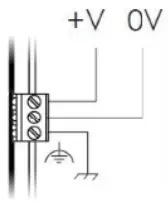
Connecting Ports
- Ethernet
CAT-5e shielded cable with RJ45 connector - USB Device
Standard USB cable with Mini-B USB plug (USC-C plug in US15) - USB Host
Standard USB device with Type-A plug - Connecting Audio
- Audio-Out
Use a 3.5mm stereo audio plug with shielded audio cable.Note that only Pro models support this feature. - Audio Pinout
- Headphone Left Out (Tip)
- Headphone Right Out (Ring
- Ground (Ring
- Don’t connect (Sleeve)
- Audio-Out

Note that the letters “xx” in the model numbers indicate that the section applies to both B5/C5 and B10/C10 models.
- US5 -xx-TR22, US5-xx-T24 US7-xx-TR22, US7-xx-T24
- US10 -xx-TR22, US10-xx-T24 I/O Connection Points
The IOs for these models are arranged in two groups of fifteen points each, as shown in the figures to the right.
- Top group
Input connection points - Bottom group
Output connection points
The function of certain I/Os may be adapted via wiring and software settings.
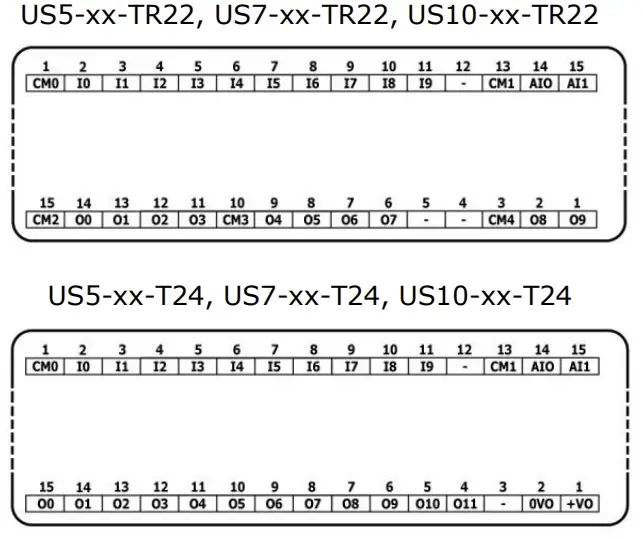
Wiring the Digital Inputs
All 10 digital inputs share the common point CM0. The digital inputs may be wired together as sink or source.

NOTE
Use sink input wiring to connect a sourcing (pnp) device. Use source input wiring to connect a sinking (npn) device.
Wiring the Analog Inputs
Both inputs share the common point CM1.
NOTE
- The inputs are not isolated.
- Each input offers two modes: voltage or current. You can set each input independently.
- The mode is determined by the hardware configuration within the software application.
- Note that if, for example, you wire the input to current, you must also set it to current in the software application.
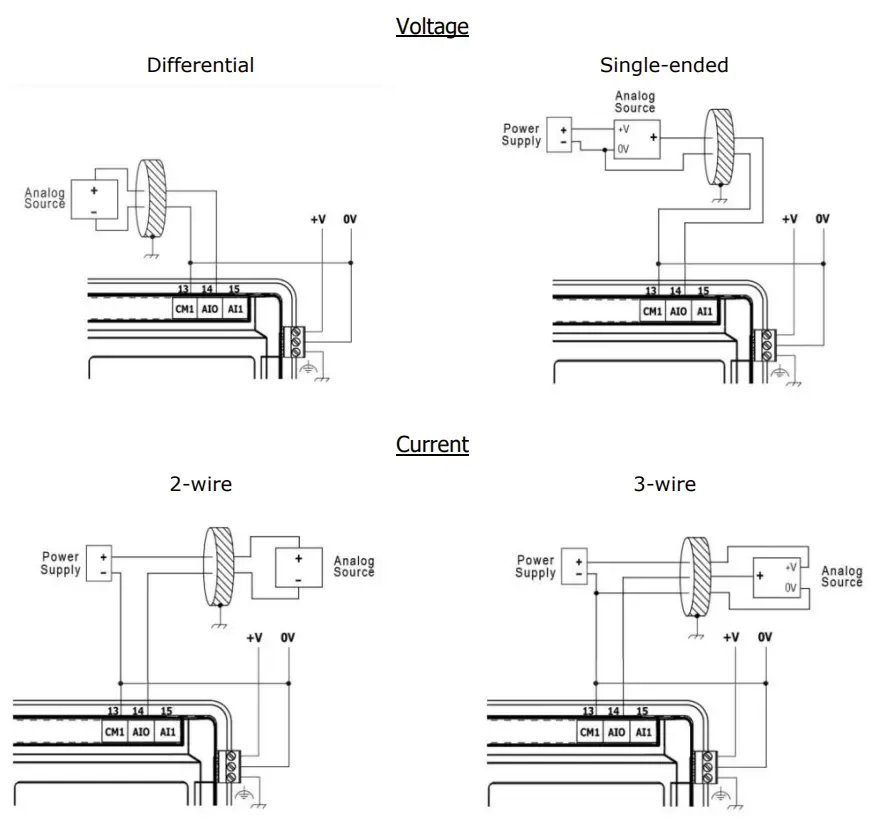
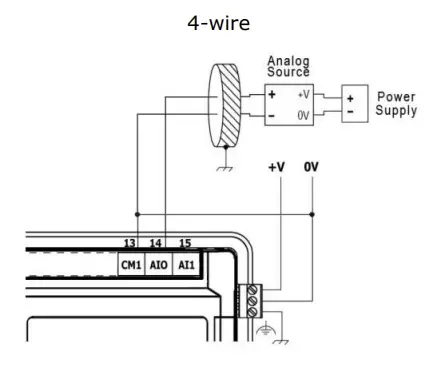
Wiring the Relay Outputs (US5 -xx-TR22, US7-xx-TR22, US10-xx-TR22)
To avoid risk of fire or property damage, always use a limited current source or connect a current limiting device in series with the relay contacts
The relay outputs are arranged in two isolated groups:
- O0-O3 share the common return CM2.
- O4-O7 share the common return CM3.

Increasing Contact Life Span
To increase the life span of the relay contacts and protect the controller from potential damage by reverse EMF, connect:
- a clamping diode in parallel with each inductive DC load,
- a RC snubber circuit in parallel with each inductive AC load

Wiring the Sink Transistor Outputs (US5-xx-TR22, US7-xx-TR22, US10-xx-TR22)
- Connect a current limiting device in series with outputs O8 and O9. These outputs are not short-circuited protected.
- Outputs O8 and O9 can independently be configured as either normal digital outputs or as high speed PWM outputs.
- Outputs O8 and O9 share the common point CM4.
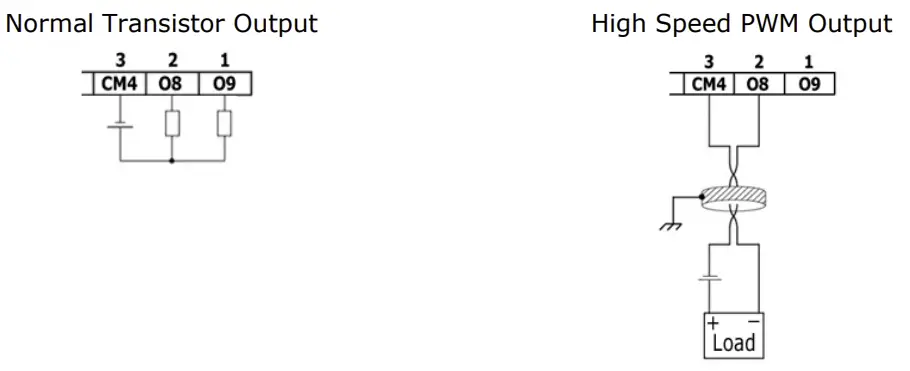
Wiring the Source Transistor Outputs (US5-xx-T24, US7-xx-T24, US10-xx-T24)
- Output’s power supply
The use of any of the outputs requires an external 24VDC power supply as shown in the accompanying figure. - Outputs
Connect the +VO and 0VO terminals as shown in the accompanying figure. O0-O11 share common return 0VO.
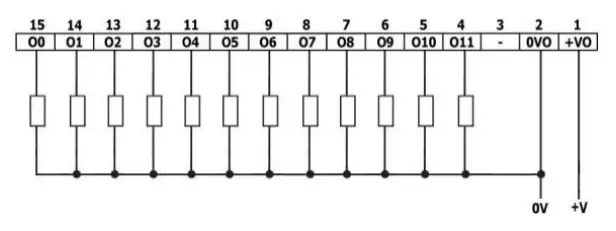
Installing Uni-I/O™ & Uni-COM™ Modules
Refer to the Installation Guides provided with these modules.
- Turn off system power before connecting or disconnecting any modules or devices.
- Use proper precautions to prevent Electro-Static Discharge (ESD).
Uninstalling the Controller
- Disconnect the power supply.
- Remove all wiring and disconnect any installed devices according to the device’s installation guide.
- Unscrew and remove the mounting brackets, taking care to support the device to prevent it from falling during this procedure.
- The information in this document reflects products at the date of printing. Unitronics reserves the right, subject to all applicable laws, at any time, at its sole discretion, and without notice, to discontinue or change the features, designs, materials and other specifications of its products, and to either permanently or temporarily withdraw any of the forgoing from the market.
- All information in this document is provided “as is” without warranty of any kind, either expressed or implied, including but not limited to any implied warranties of merchantability, fitness for a particular purpose, or non-infringement. Unitronics assumes no responsibility for errors or omissions in the information presented in this document. In no event shall Unitronics be liable for any special, incidental, indirect or consequential damages of any kind, or any damages whatsoever arising out of or in connection with the use or performance of this information.
- The tradenames, trademarks, logos and service marks presented in this document, including their design, are the property of Unitronics (1989) (R”G) Ltd. or other third parties and you are not permitted to use them without the prior written consent of Unitronics or such third party as may own them
Technical Specifications
- Unitronics’ UniStream® Built-in series are PLC+HMI All-in-One programmable controllers.
- UniStream connects directly to UniCloud, Unitronics’ IIoT cloud platform using built-in UniCloud connectivity. More information about UniCloud is available at www.unitronics.cloud.
Model numbers in this document
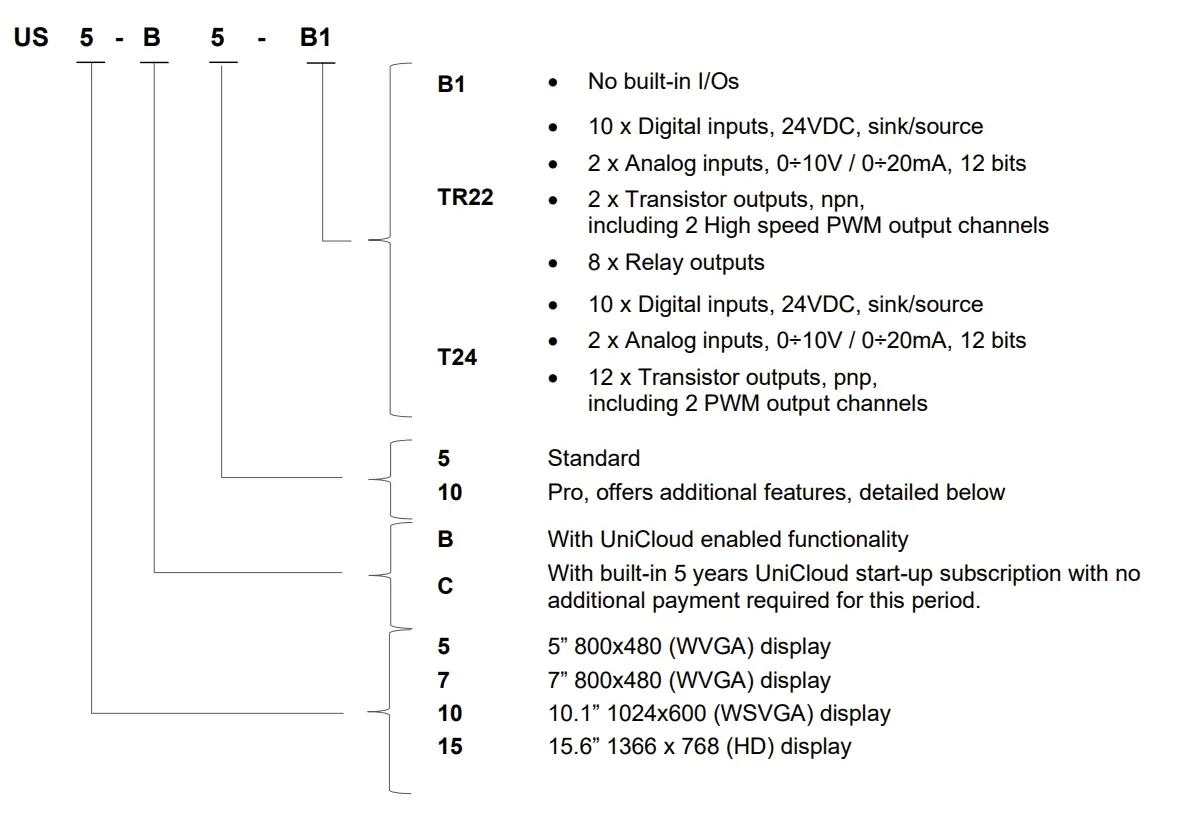
- No built-in I/Os
- 10 x Digital inputs, 24VDC, sink/source
- 2 x Analog inputs, 0÷10V / 0÷20mA, 12 bits
- 2 x Transistor outputs, npn, including 2 High speed PWM output channels
- 8 x Relay outputs
- 10 x Digital inputs, 24VDC, sink/source
- 2 x Analog inputs, 0÷10V / 0÷20mA, 12 bits
- 12 x Transistor outputs, pnp, including 2 PWM output channels
Standard
Pro, offers additional features, detailed below
With UniCloud enabled functionality
With built-in 5 years UniCloud start-up subscription with no additional payment required for this period.
- 5” 800×480 (WVGA) display
- 7” 800×480 (WVGA) display
- 10.1” 1024×600 (WSVGA) display
- 15.6” 1366 x 768 (HD) display
Installation Guides are available in the Unitronics Technical Library at www.unitronicsplc.com.
| Power Supply | USx-xx-B1 | USx-xx-TR22 | USx-xx-T24 | |
| Input voltage | 12VDC or 24VDC | 24VDC | 24VDC | |
| Permissible range | 10.2VDC to 28.8VDC | 20.4VDC to 28.8VDC | 20.4VDC to 28.8VDC | |
| Max. current
consumption |
US5 | 0.7A@12VDC
0.4A@24VDC |
0.44A@24VDC | 0.4A@24VDC |
| US7 | 0.79A@12VDC
0.49A@24VDC |
0.53A@24VDC | 0.49A@24VDC | |
| US10 | 0.85A@12VDC
0.52A@24VDC |
0.56A@24VDC | 0.52A@24VDC | |
| US15 | 2.2A@12VDC
1.1A@24VDC |
None | None | |
| Isolation | None | |||
| Display | UniStream 5″ | UniStream 7″ | UniStream 10.1″ | UniStream 15.6″ |
| LCD type | TFT | |||
| Backlight type | White LED | |||
| Luminous intensity (brightness) | Typically 350 nits (cd/m2), at 25°C | Typically 400 nits (cd/m2), at 25°C | Typically 300 nits (cd/m2), at 25°C | Typically 400 nits (cd/m2), at 25°C |
| Backlight longevity
|
30k hours | |||
| Resolution (pixels) | 800 x 480 (WVGA) | 1024 x 600 (WSVGA) | 1366 x 768 (HD) | |
| Size | 5” | 7″ | 10.1″ | 15.6” |
| Viewing area | Width x Height (mm) 108 x 64.8 | Width x Height (mm)
154.08 x 85.92 |
Width x Height (mm) 222.72 x 125.28 | Width x Height (mm) 344.23 x 193.53 |
| Color support | 65,536 (16bit) | 16M (24bit) | ||
| Surface treatment | Anti-glare | |||
| Touch screen | Resistive Analog | |||
| Actuation force (min) | > 80 g (0.176 lb) | |||
| General | |
| I/O support | Up to 2,048 I/O points |
| Built-in I/O | According to model |
| Local I/O expansion | To add local I/Os, use UAG-CX I/O Expansion Adapters. These adapters provide the connection point for standard UniStream Uni-I/O™ modules.
You can connect up to 80 I/O modules to a single controller using these adapters. US15 only – Integrate I/O into your system by using UAG-BACK-IOADP adapter, snap onto the panel for an all-in-one configuration. |
| Remote I/O | Up to 8 UniStream Remote I/O Adapters (URB) |
| Communication Ports | |
| Built-in COM ports | Specifications are provided below in the section Communications |
| Add-on Ports | Add up to 3 ports to a single controller using Uni-COM™ UAC-CX Modules |
| Internal memory | Standard (B5/C5) | Pro (B10/C10) |
| RAM: 512MB
ROM: 3GB system memory 1GB user memory |
RAM: 1GB
ROM: 6GB system memory 2GB user memory |
|
| Ladder memory | 1 MB | |
| External memory | microSD or microSDHC card
Size: up to 32GB, Data Speed: up to 200Mbps |
|
| Bit operation | 0.13 µs | |
| Battery | Model: 3V CR2032 Lithium battery
Battery lifetime: 4 years typical, at 25°C Battery Low detection and indication (via the HMI and via System Tag). |
|
| Audio (Pro B10/C10 models only) | |
| Bit Rate | 192kbps |
| Audio compatibility | Stereo MP3 files |
| Interface | 3.5mm Audio-out jack – use shielded audio cable of up to 3 m (9.84 ft) |
| Impedance | 16Ω, 32Ω |
| Isolation | None |
| Video (Pro B10/C10 models only) | |
| Supported Formats | MPEG-4 Visual, AVC/H.264 |
| Communication (Built-in Ports) | US5, US7, US10 | US15 |
| Ethernet port | ||
| Number of ports | 1 | 2 |
| Port type | 10/100 Base-T (RJ45) | |
| Auto crossover | Yes | |
| Auto negotiation | Yes | |
| Isolation voltage | 500VAC for 1 minute | |
| Cable | Shielded CAT5e cable, up to 100 m (328 ft) | |
| USB device | ||
| Port type | Mini-B | USB-C |
| Data rate | USB 2.0 (480Mbps) | |
| Isolation | None | |
| Cable | USB 2.0 compliant; < 3 m (9.84 ft) | |
| USB host | ||
| Over current protection | Yes | |
| Digital Inputs (T24, TR22 models) | |
| Number of inputs | 10 |
| Type | Sink or Source |
| Isolation voltage | |
| Input to bus | 500VAC for 1 minute |
| Input to input | None |
| Nominal voltage | 24VDC @ 6mA |
| Input voltage | |
| Sink/Source | On state: 15-30VDC, 4mA min. Off state: 0-5VDC, 1mA max. |
| Nominal impedance | 4kΩ |
| Filter | 6ms typical |
| Analog Inputs (T24, TR22 models) | |||||||
| Number of inputs | 2 | ||||||
| Input range (6) (Error! Reference source not found.) | Input Type | Nominal Values | Over-range Values * | ||||
| 0 ÷ 10VDC | 0 ≤ Vin ≤ 10VDC | 10 < Vin ≤ 10.15VDC | |||||
| 0 ÷ 20mA | 0 ≤ Iin ≤ 20mA | 20 < Iin ≤ 20.3mA | |||||
| * Overflow (7) is declared when an input value exceeds the Over-range boundary. | |||||||
| Absolute maximum rating | ±30V (Voltage), ±30mA (Current) | ||||||
| Isolation | None | ||||||
| Conversion method | Successive approximation | ||||||
| Resolution | 12 bits | ||||||
| Accuracy
(25°C / -20°C to 55°C) |
±0.3% / ±0.9% of full scale | ||||||
| Input impedance | 541kΩ (Voltage), 248Ω (Current) | ||||||
| Noise rejection | 10Hz, 50Hz, 60Hz, 400Hz | ||||||
| Step response (8)
(0 to 100% of final value) |
Smoothing | Noise Rejection Frequency | |||||
| 400Hz | 60Hz | 50Hz | 10Hz | ||||
| None | 2.7ms | 16.86ms | 20.2ms | 100.2ms | |||
| Weak | 10.2ms | 66.86ms | 80.2ms | 400.2ms | |||
| Medium | 20.2ms | 133.53ms | 160.2ms | 800.2ms | |||
| Strong | 40.2ms | 266.86ms | 320.2ms | 1600.2ms | |||
| Update time (8) | Noise Rejection Frequency | Update Time |
| 400Hz | 5ms | |
| 60Hz | 4.17ms | |
| 50Hz | 5ms | |
| 10Hz | 10ms | |
| Operational signal range (signal + common mode) | Voltage mode – AIx: -1V ÷ 10.5V ; CM1: -1V ÷ 0.5V Current mode – AIx: -1V ÷ 5.5V ; CM1: -1V ÷ 0.5V
(x=0 or 1) |
|
| Cable | Shielded twisted pair | |
| Diagnostics (7) | Analog input overflow | |
| Relay Outputs (USx-xx-TR22) | |
| Number of outputs | 8 (O0 to O7) |
| Output type | Relay, SPST-NO (Form A) |
| Isolation groups | Two groups of 4 outputs each |
| Isolation voltage | |
| Group to bus | 1,500VAC for 1 minute |
| Group to group | 1,500VAC for 1 minute |
| Output to output within group | None |
| Current | 2A maximum per output (Resistive load) |
| Voltage | 250VAC / 30VDC maximum |
| Minimum load | 1mA, 5VDC |
| Switching time | 10ms maximum |
| Short-circuit protection | None |
| Life expectancy (9) | 100k operations at maximum load |
| Sink Transistor Outputs (USx-xx-TR22) | |
| Number of outputs | 2 (O8 and O9) |
| Output type | Transistor, Sink |
| Isolation | |
| Output to bus | 1,500VAC for 1 minute |
| Output to output | None |
| Current | 50mA max. per output |
| Voltage | Nominal: 24VDC
Range: 3.5V to 28.8VDC |
| On state voltage drop | 1V max |
| Off state leakage current | 10µA max |
| Switching times | Turn-on: 1.6ms max. )4kΩ load, 24V)
Turn-off: 13.4ms max. )4kΩ load, 24V) |
| High speed outputs | |
| PWM Frequency | 0.3Hz min.
30kHz max. )4kΩ load( |
| Cable | Shielded twisted pair |
| Source Transistor Outputs (USx-xx-T24) | |
| Number of outputs | 12 |
| Output type | Transistor, Source (pnp) |
| Isolation voltage | |
| Output to bus | 500VAC for 1 minute |
| Output to output | None |
| Outputs power supply to bus | 500VAC for 1 minute |
| Outputs power supply to output | None |
| Current | 0.5A maximum per output |
| Voltage | See Source Transistor Outputs Power Supply specification below |
| ON state voltage drop | 0.5V maximum |
| OFF state leakage current | 10µA maximum |
| Switching times | Turn-on: 80ms maximum, Turn-off: 155ms maximum
(Load resistance < 4kΩ( |
| PWM Frequency (10) | O0, O1:
3kHz max. (Load resistance < 4kΩ) |
| Short-circuit protection | Yes |
| Source Transistor Outputs Power Supply (USx-xx-T24) | |
| Nominal operating voltage | 24VDC |
| Operating voltage | 20.4 – 28.8VDC |
| Maximum current consumption | 30mA@24VDC
Current consumption does not include load current |
| Environmental | US5, US7, US10 | US15 |
| Protection | Front face: IP66, NEMA 4X Rear side: IP20, NEMA1 | |
| Operating temperature | -20°C to 55°C (-4°F to 131°F) | 0°C to 50°C (32°F to 122°F) |
| Storage temperature | -30°C to 70°C (-22°F to 158°F) | -20°C to 60°C (-4°F to 140°F) |
| Relative Humidity (RH) | 5% to 95% (non-condensing) | |
| Operating Altitude | 2,000 m (6,562 ft) | |
| Shock | IEC 60068-2-27, 15G, 11ms duration | |
| Vibration | IEC 60068-2-6, 5Hz to 8.4Hz, 3.5mm constant amplitude, 8.4Hz to 150Hz, 1G acceleration | |
| Dimensions | Weight | Size |
| US5-xx-B1 | 0.31 Kg (0.68 lb) | Refer to the images on page 7 |
| US5-xx-TR22 | 0.37 Kg (0.81 lb) | |
| US5-xx-T24 | 0.35 Kg (0.77 lb) | |
| US7-xx-B1 | 0.62 Kg (1.36 lb) | Refer to the images on page 8 |
| US7-xx-TR22 | 0.68 Kg (1.5 lb) | |
| US7-xx-T24 | 0.68 Kg (1.5 lb) | |
| US10-xx-B1 | 1.02 Kg (2.25 lb) | Refer to the images on page 8 |
| US10-xx-TR22 | 1.08 Kg (2.38 lb) | |
| US10-xx-T24 | 1.08 Kg (2.38 lb) | |
| US15-xx-B1 | 2.68Kg (5.9 lb) | Refer to the images on page 9 |
Notes:
- The typical backlight lifespan of the HMI panel is the time after which its brightness decreases to 50% of its original level.
- UAG-CX Expansion Adapter Kits consist of a Base unit, an End unit, and a connecting cable. The Base Unit connects to the controller’s I/O Expansion Jack and allows for the connection of standard UniStream Uni-I/O™ modules. For more details, refer to the product’s installation guide and technical specifications.
- Uni-COM™ CX modules are plugged directly into the Uni-COM™ CX Module Jack on the back of the controller. UAC-CX modules can be installed in the following configurations:
- If a serial port module is attached directly to the back of UniStream, it can only be followed by another serial module, for a total of two modules.
- If the configuration includes a CANbus module, it must be connected directly to the back of UniStream and can be followed by up to two serial modules, for a total of three modules. For additional information, refer to the product’s installation guide and technical specifications.
- When replacing the unit’s battery, ensure that the new battery meets or exceeds the environmental specifications outlined in this document.
- The USB device port is used to connect the device to a PC.
- The 4-20mA input option is implemented using the 0-20mA input range. The analog inputs measure values slightly above the nominal input range (Input Over-range). When an input overflow occurs, the corresponding I/O Status tag indicates this, while the input value is recorded as the maximum allowable value. For example, if the input range is 0 to 10V, Over-range values can reach up to 10.15V, and any input voltage above that will still register as 10.15V, with the Overflow system tag activated.
- Diagnostic results are displayed in system tags and can be viewed through UniApps™ or the online state of UniLogic™.
- Step response and update time are independent of the number of channels that are used.
- The life expectancy of relay contacts varies depending on the application. The product’s installation guide provides guidelines for using the contacts with long cables or inductive loads.
- Outputs O0 and O1 can be configured as either standard digital outputs or as PWM outputs. PWM outputs specifications apply only when outputs are configured as PWM outputs.
- The information in this document reflects products at the date of printing. Unitronics reserves the right, subject to all applicable laws, at any time, at its sole discretion, and without notice, to discontinue or change the features, designs, materials and other specifications of its products, and to either permanently or temporarily withdraw any of the forgoing from the market.
- All information in this document is provided “as is” without warranty of any kind, either expressed or implied, including but not limited to any implied warranties of merchantability, fitness for a particular purpose, or non-infringement. Unitronics assumes no responsibility for errors or omissions in the information presented in
this document. In no event shall Unitronics be liable for any special, incidental, indirect or consequential damages of any kind, or any damages whatsoever arising out of or in connection with the use or performance of this information. - The tradenames, trademarks, logos and service marks presented in this document, including their design, are the property of Unitronics (1989) (R”G) Ltd. or other third parties and you are not permitted to use them without the prior written consent of Unitronics or such third party as may own them.
FAQ
Q: Can I install the unit in an area with high humidity?
A: It is not recommended to install the unit in areas with excessive moisture. Ensure to follow the specified environmental considerations.
Q: What programming software is compatible with the device?
A: The device is compatible with the all-in-one software available as a free download from Unitronics for hardware configuration, communications, and HMI/PLC applications.
Documents / Resources
 |
Unitronics US5-B5-B1 Built In UniStream Programmable Logic Controller [pdf] User Guide US5-B5-B1, US5-B5-B1 Built In UniStream Programmable Logic Controller, Built In UniStream Programmable Logic Controller, UniStream Programmable Logic Controller, Programmable Logic Controller, Logic Controller |
